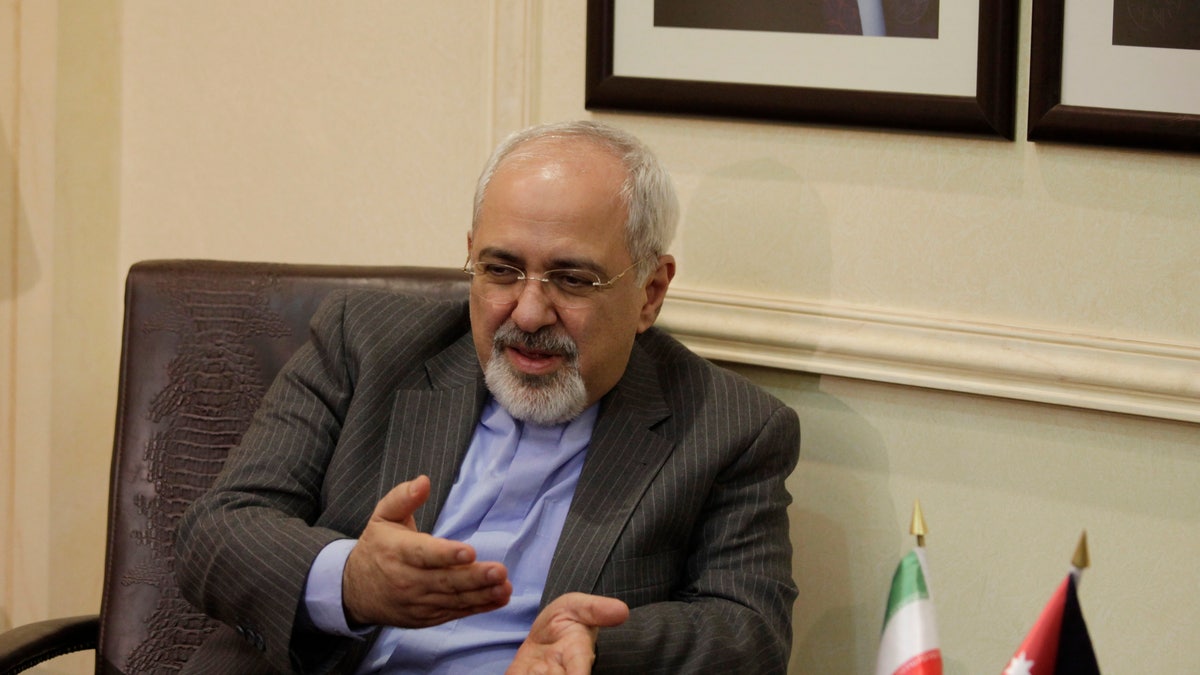
Iranian Foreign Minister Mohammad Javad Zarif meets with his Jordanian counterpart Nasser Judeh in Amman, Jordan, Tuesday, Jan. 14, 2014. Zarif visits Jordan as part of his regional tour of the Middle East countries including Iraq, Kuwait, Lebanon, Oman, Qatar and United Arab Emirates. (AP Photo/Mohammad Hannon, Pool) (The Associated Press)
DAMASCUS, Syria – Syria's president and Iran's foreign minister on Wednesday discussed next week's United Nations conference that aims to resolve Syria's three-year conflict, calling on regional nations to "fight terrorism."
Iran is President Bashar Assad's strongest regional ally, extending him billions of dollars in credit since the crisis began in March 2011. The United States, Saudi Arabia and other countries in the Persian Gulf suspect Tehran is also shipping him weapons.
Syria's state news agency SANA said Iranian Foreign Minister Mohammad Javad Zarif expressed Tehran's support for Assad's government as it heads to the conference. Zarif's visit comes ahead of the Jan. 22 conference in Montreux, Switzerland.
The U.N., which is hosting the talks, has not yet invited Iran to attend, although a final decision has yet to be made. The prospects for success at the talks appear slim at best, however.
Assad warned against what he described as the dangers of Saudi Arabia's brand of purist Islam, telling SANA: "Wahabi ideology now threatens the whole world, not only regional states."
"The Syrian people and others in the region now know the dangers of this terrorist ideology and everyone should participate in confronting and eradicating it," Assad was quoted as saying.
Sunni powerhouse Saudi Arabia, archrival of Shiite Iran, is among the strongest backers of Syria's opposition fighters who are trying to end four decades of Assad family rule in Syria. Assad belongs to the minority Alawite sect, an off-shoot of Shiite Islam, while most opposition fighters are Sunnis.
The agency quoted Zarif as saying that "countries of the region should unite to confront the challenges and fight terrorism in order to achieve security and stability."
The Syrian government says it is fighting "terrorists" who came from more than 80 countries. Last year, Lebanon's Iran-backed Hezbollah group openly started taking part in Syria's civil war, fighting along Assad's forces.
In 2012, the chief commander of Iran's powerful Revolutionary Guard, Gen. Mohammad Ali Jafari, said the unit had high-level advisers in Syria but denied it has fighters there. More recently, however, analysts say that Iranian troops and commanders have taken on a more direct role in the conflict.
In November, Iran's semiofficial Mehr news agency said a commander in the Guard had been killed in Syria. It said Mohammad Jamali was killed by "terrorists" a few days ago but did not provide details.
Elsewhere in Syria, activists reported violence in different areas including the northwestern province of Idlib, where a local commander of the Al Qaeda-linked Islamic State of Iraq and the Levant was killed by members of a rival rebel group.
The Britain-based Syrian Observatory for Human Rights said the ISIL commander in the town of Saraqeb was a Belgian citizen of Algerian origin and was killed along with another foreign fighter when they were ambushed by a rival rebel group.
Hundreds of people have been killed over the past two weeks in fighting between ISIL and other Islamic groups in northern and eastern Syria.
Syria's state TV said government forces killed "dozens of terrorists" in different areas including Idlib, the southern province of Daraa and the eastern region of Deir el-Zour that borders Iraq. Syria's state media refers to rebels as terrorists.







































